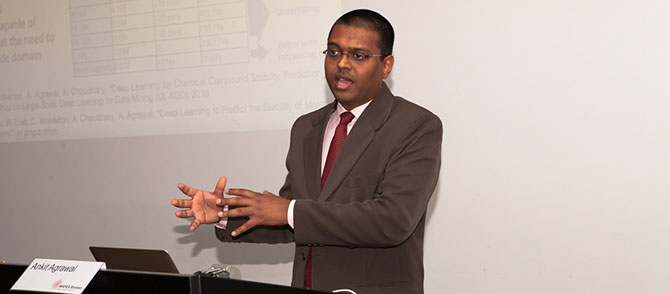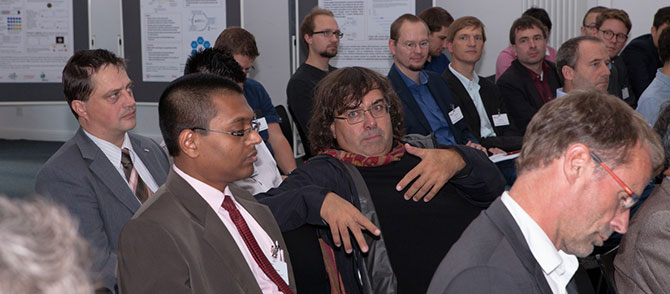Agrawal Gives Invited Talk at MAPEX Symposium on Materials Informatics
His talk was titled: "Materials Informatics and Big Data: Realization of “Fourth Paradigm” of Science in Materials Science."

Prof. Ankit Agrawal recently gave an invited lecture about his research on materials informatics and data mining at the MAPEX Symposium 2017 organized by the MAPEX Center for Materials and Processes at University of Bremen, Germany. His talk was titled: "Materials Informatics and Big Data: Realization of “Fourth Paradigm” of Science in Materials Science". Prof. Agrawal's research in the field of materials informatics is supported by NIST CHiMaD, AFOSR MURI, DARPA SIMPLEX, NSF Big Data Spoke, and NU-DSI grants.
The theme of this year's MAPEX symposium was the still young research field 'materials informatics', and featured invited talks from three internationally leading scientists in the field, along with other talks and flashlight/poster presentations from researchers and scientists from University of Bremen. In addition to Prof. Agrawal, the other invited speakers were Prof. Nicola Marzari from the National Centre for Competence in Research, EPFL Lausanne, Switzerland, and Prof. Krishna Rajan from the Department of Materials Design and Innovation, University at Buffalo, USA.
Agrawal is a Research Associate Professor of EECS at Northwestern University. His research on high performance big data mining aims at a coherent integration of high performance computing and data mining to develop customized solutions for big data problems with an emphasis on interdisciplinary impact. His research has contributed to large-scale data-guided discovery in various science/engineering disciplines, such as materials science, healthcare, bioinformatics, and social media, with several interdisciplinary collaborations with domain scientists in respective fields. He has co-authored 100+ peer-reviewed papers, including those at top-tier computer science venues such as KDD, ICDM, CIKM, SDM, ICDE, Supercomputing, HiPC, and interdisciplinary ones like Nature Scientific Reports, APL Materials, npj Computational Materials, JAMIA, PRB, and TCBB. He has also developed and released several open-source software, been on program committees of major research conferences, and has served as a PI/Co-PI on funded research grants from NSF, DOE, AFOSR, NIST, DARPA, and NU-DSI.

